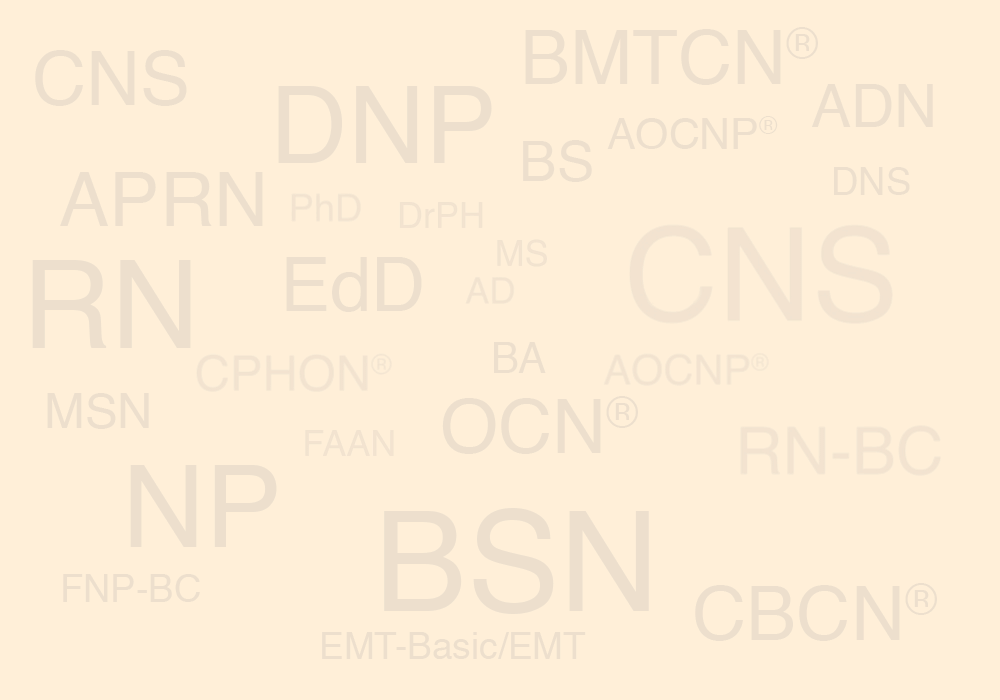Do you remember the pride you felt when you first put “RN” after your name? Your credentials represent your hard work and dedication. As you add to your education and training, listing your credentials in a standard order ensures they are as meaningful to others as they are to you.
“Credentials have an important role in communicating a healthcare provider’s qualifications,” Oncology Nursing Certification Corporation (ONCC) Executive Director Tony Ellis, MSEd, CAE, ICE-CCP, said. “Presenting credentials in a standardized way will help both healthcare professionals and the public understand the significance of the credentials.”
When writing articles, speaking at professional meetings, or providing legislative testimony, your credentials lend credence to what you are saying. But they are also necessary in your day-to-day work, such as using state or practice credentials on legal documents, prescriptions, or medical notes.
I Have More Than One Credential; What Do I Do?
The American Nurses Credentialing Center (ANCC) published a guideline in 2015 to advise on which credentials to list and in what order, and it follows the order that ONCC recommends using, too, Ellis said.
ANCC recommends listing nursing credentials in this order:
- Highest earned degree: Educational credentials should be listed first because they can’t be taken away (except in extreme circumstances). If you have degrees in different fields, list the highest non-nursing degree first, followed by the highest nursing degree. If you have advanced degrees, use them instead of your bachelor’s or master’s degree.
- Associate degrees: AD, AND
- Bachelor’s degrees: BS, BSN, BA
- Master’s degrees: MSN, MS, MA
- Doctoral degrees: PhD, DrPH, DNS, EdD, DNP
- Licensure and state designations or requirements to practice:
- Advanced practice RN (APRN)
- Nurse practitioner (NP)
- Clinical nurse specialist (CNS)
- National certifications: Accredited certifying bodies, like ONCC, award national certifications. ANCC recommends listing your nursing certifications first, followed by non-nursing certifications.
- ONCC’s active certifications are:
- Oncology Certified Nurse (OCN®)
- Certified Pediatric Hematology Oncology Nurse (CPHON®)
- Certified Breast Care Nurse (CBCN®)
- Blood and Marrow Transplant Certified Nurse (BMTCN®)
- Advanced Oncology Certified Nurse Practitioner (AOCNP®)
- Nurses may also have earned ONCC’s:
- Advanced Oncology Certified Nurse (AOCN®)
- Advanced Oncology Certified Clinical Nurse Specialist (AOCNS®)
- Certified Pediatric Oncology Nurse (CPON®)
- Other examples of certifications include:
- Adult–Gerontology Clinical Nurse Specialist (AGCNS-BC)
- Family Nurse Practitioner–Board Certified (FNP-BC)
- Nursing Professional Development Certification (NPD-BC)
- RN–Board Certified (RN-BC)
- ONCC’s active certifications are:
- Awards, honors, and other recognitions: Conclude your credentials list with honors like Fellow of the American Academy of Nursing (FAAN) or non-nursing certifications such as EMT–Basic/EMT, awarded by the National Registry of Emergency Medical Technicians.
Are Certifications and Certificates Part of My Credentials?
In the joint Oncology Certification for Nurses position statement, ONS and ONCC maintain the importance of rigorous, accredited certification programs (e.g., ONCC’s oncology nursing certification list) that meet stringent requirements that benefit patients, families, nurses, and employers. By obtaining certifications, nurses demonstrate that they have the knowledge and skills required to competently perform their jobs. If you’re certified, proudly display the evidence of your accomplishments in your credentials list on name badges, bylines, and other documentation after your name.
You may also earn certificates throughout your career, but those are different from certifications and are not included as credentials after your name. Instead, list them as accomplishments on your curriculum vitae (CV). For example, nurses who pass the post-tests for the ONS/ONCC Chemotherapy/Immunotherapy Certificate™ or the ONS/ONCC Radiation Therapy Certificate™ courses receive a certificate of added qualification. On your CV, you should say that you “hold” the ONS/ONCC Chemotherapy/Immunotherapy or Radiation Therapy Certificate of Added Qualification.
The investments you’ve made to achieve your oncology nursing credentials demonstrate your incredible work and expertise. Use this guide to show others that you are knowledgeable, qualified, and skilled to serve in your role.






